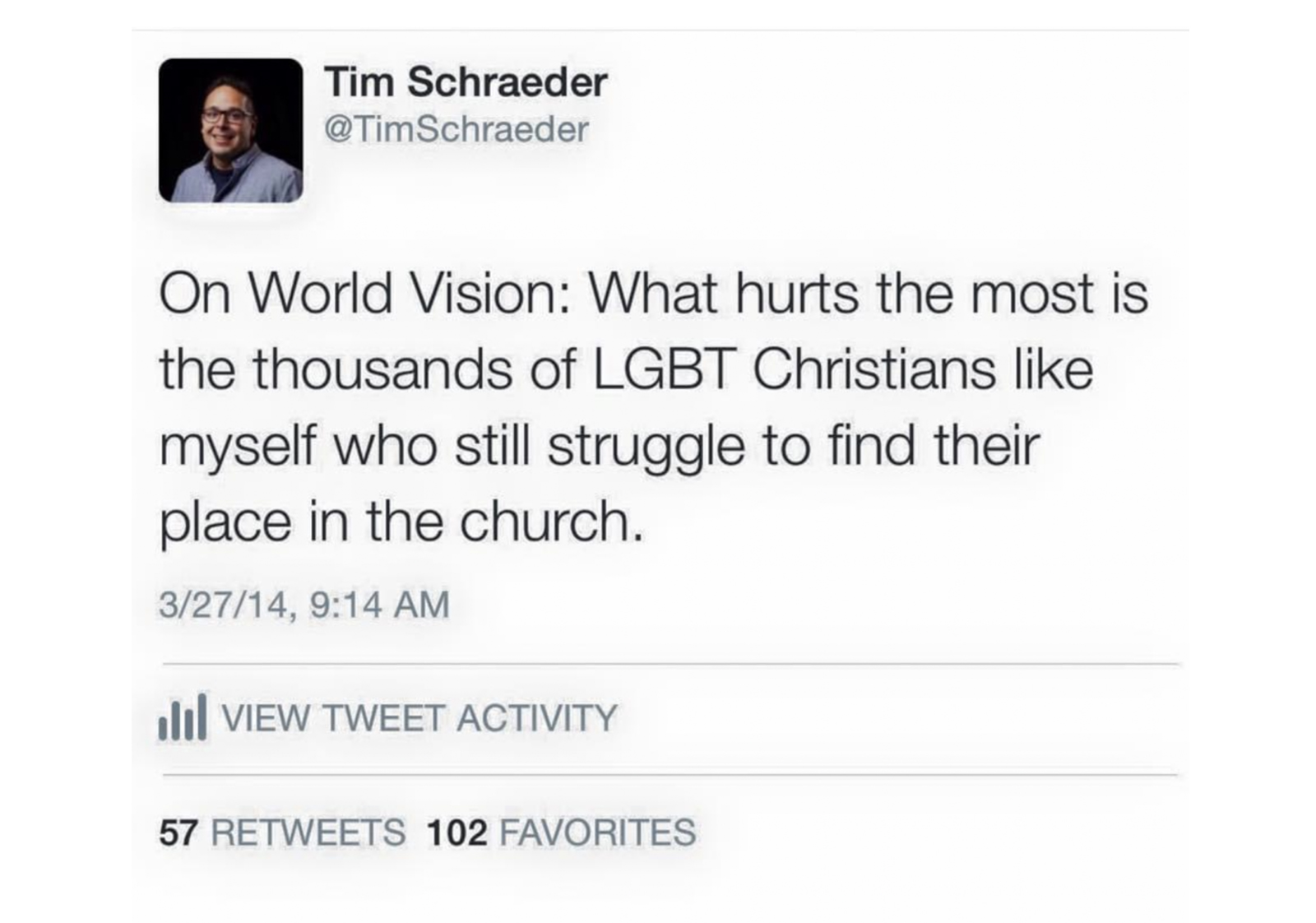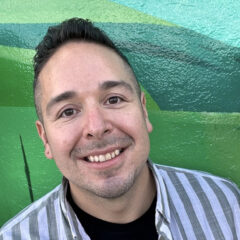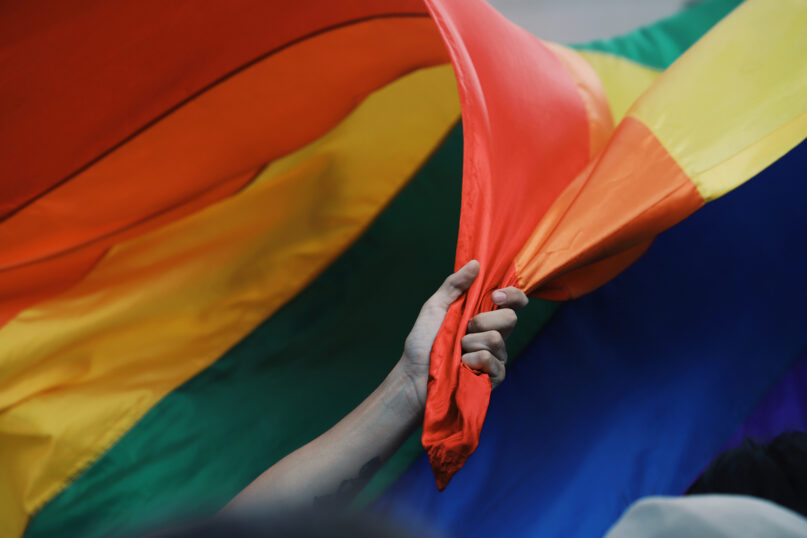(RNS) — Ten years ago this week, the ecumenical Christian humanitarian aid organization World Vision momentarily offered a glimpse of hope to LGBTQ+ Christians when it announced a change in hiring policy.
Then-CEO Richard Stearns had decided that being married to a person of the same sex would no longer be a barrier to employment with World Vision, which has a staff of more than 35,000 in more than 100 offices around the world. The change was meant to bridge divides and allow Christians of all theological stances to focus on a unified mission of serving the poor.
The initial announcement sparked a wave of hope among many LGBTQ+ Christians. It seemed to signal a shift toward inclusivity in the broader church community, but especially the evangelical sector, where few churches are LGBTQ-affirming. For a fleeting moment, it seemed as though the tide was turning, promising a future where one’s faith and identity could coexist without conflict.
In March 2014, I had worked in evangelical Christian churches for nearly a decade, while privately battling my sexuality. The conflict had led me down the harrowing path of gay conversion therapy, under the now-defunct Exodus International. When my prayers for God to change my sexual orientation went unanswered, I suffered a nervous breakdown, left conversion therapy and resigned from my role at a church in Chicago. My employment there was contingent on me pursuing change.
While I continued to figure out how to integrate my faith and sexuality, I found a way to pursue my calling to Christian service by working as a contractor for influential evangelical leaders and megachurches, for whom my public relations skill set was in demand. My employment, however, came with an unspoken condition: My sexuality had to remain hidden. Nondisclosure agreements became a standard precaution, as they were for many LGBTQ+ individuals in similar positions. Our contributions were valued as long as our true selves remained concealed.
But World Vision’s policy change briefly offered hope — until a swift backlash from donors, churches and individual Christian leaders forced the organization to issue a public apology less than 48 hours later. The attempt at inclusion and the quick reversal demonstrated the deep divisions within the evangelical community over LGBTQ+ inclusion.
To those of us who had advocated for change from within the church, the moment was clarifying. Many, like me, realized the cost of our silence was too high. It was time to speak out.
Leveraging my modest social media presence, I publicly came out, framing my statement around World Vision’s pivot and its impact on LGBTQ+ Christians struggling to find their place in the church. Within hours I got messages of overwhelming support. I also felt the immediate and inevitable professional repercussions.
 One of the first calls I got was from a pastor of a growing megachurch in the South whose book, with my help, had made The New York Times bestseller list. While expressing support for my courage to come out, he requested I remove any association of my work with his church from my social media, including the book. A leading Christian literary agency abruptly ended our partnership, while offering to pay out the remainder of my contract.
One of the first calls I got was from a pastor of a growing megachurch in the South whose book, with my help, had made The New York Times bestseller list. While expressing support for my courage to come out, he requested I remove any association of my work with his church from my social media, including the book. A leading Christian literary agency abruptly ended our partnership, while offering to pay out the remainder of my contract.
Perhaps most telling was the reaction from a major evangelical leader, whose book launch I had a verbal agreement to handle. Her publisher’s discomfort with “someone like me” working on the campaign was a clear message: My openness about my sexuality was incompatible with their values and they couldn’t, in good faith, pay me to do the work we’d agreed to do together.
It became evident that my path forward would mean leaving the work that had defined my professional life and my faith. The most effective way for me to make an impact, I saw, would be beyond the confines of the church.
I resigned my role at one of America’s largest megachurches and harnessed all I knew about church marketing to help co-found Church Clarity, a platform dedicated to guiding LGBTQ+ Christians to affirming and welcoming churches. I soon relocated to New York City, seeking both a fresh start and a community that fully embraced me. There, I found solace and hope in a diverse church that not only welcomed LGBTQ+ individuals but also affirmed them in leadership roles. I got a glimpse of what the future of the evangelical church could — and should — look like.
My story is part of a larger movement of individuals committed to challenging barriers and fostering change. Since the World Vision moment, there’s been an exodus of LGBTQ Christians from the precincts where they had poured out their energy and love.
Their resilience in forging new paths, either in welcoming mainline denominations or outside traditional religious spaces, shows the courage LGBTQ+ people must have to find communities that acknowledge and celebrate their full selves, even as the churches they’ve been a part of tell them the opposite.
In the last decade there have been some advances for LGBTQ+ inclusion in the evangelical church, notably through documentaries such as “Pray Away” and “1946.” Organizations such as Q Christian Fellowship have flourished, offering spaces for connection and community among LGBTQ+ Christians. Through the power of social media, many LGBTQ+ Christians have amplified their stories and experiences, telling stories that chart a course toward a more inclusive future.
But what could have been a celebration of a milestone is instead a reminder of the long journey ahead. The landscape for LGBTQ+ individuals in evangelical Christianity is increasingly fraught, particularly as LGBTQ+ issues become more politicized. The introduction of more than 300 anti-gay bills in 2024, a significant number of which are supported by evangelical Christian churches, only heightens the tension.

Timothy Schraeder Rodriguez. (Courtesy photo)
It is urgent that affirming Christians advocate forcefully for true acceptance and understanding by religious communities. We need to keep alive the hope for a church and a society that welcomes everyone as Jesus would — just as they are.
(Timothy Schraeder Rodriguez is a co-founder of Church Clarity and was a part of the team that helped promote the Netflix documentary “Pray Away.” He resides in New York City and writes regularly on Substack. The views expressed in this commentary do not necessarily express those of Religion News Service.)





